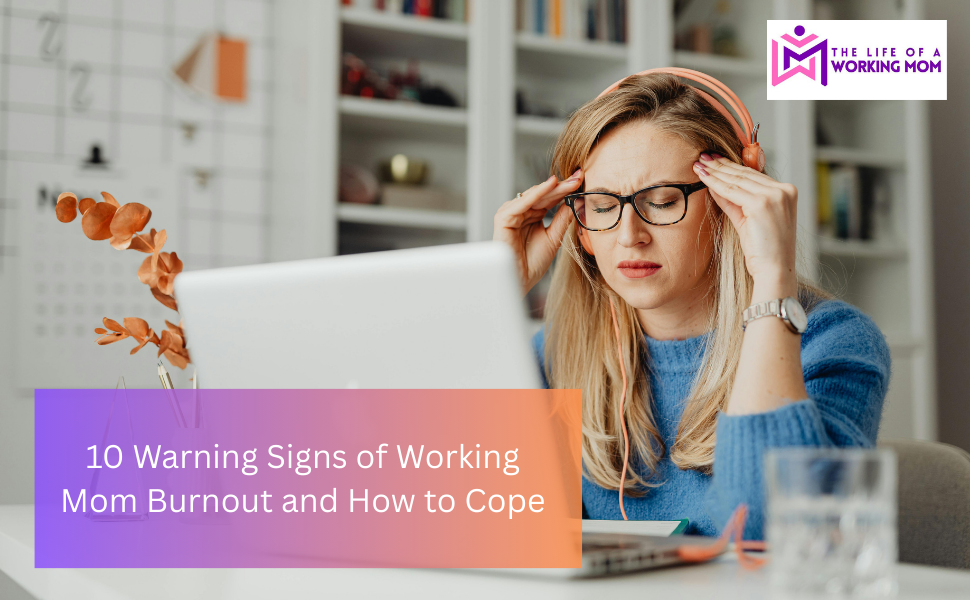You wake up feeling like you never slept, and your mind feels overwhelmed already, always thinking about preparing daily meals, laundry piling up, meetings to attend, and that one email you still haven’t replied to, only to get into bed wondering how you’ll do it all over again tomorrow.
What you’re feeling might not just be everyday tiredness. It could be a deeper indication of burnout.
As a working mom, you’re carrying a load most people don’t see and probably don’t fully understand. Burnout isn’t a weakness. It’s your body and mind’s way of telling you that something needs to change.
In this post, we’re going to walk through 10 warning signs of working mom burnout and explore simple, real-life ways to start feeling like yourself again.
What Is Burnout, and Why Does It Hit Moms So Hard?

A burnout is more than being worn out. It’s a state of deep mental, emotional, and physical exhaustion caused by long-term stress.
Working mom burnout shows up when you’re expected to be fully present at your job and fully present at home, all the time. You end up pouring into everyone else while ignoring your own empty cup.
When left unchecked, working mom burnout can quietly erode your relationships, your performance, your confidence, and your overall well-being. That’s why recognizing the signs early and taking steps to cope is so important.
10 Warning Signs You’re Experiencing Burnout
1. You’re Exhausted All the Time
One of the first signs of burnout is constant fatigue. Not just “I need a nap” tired but a deep tiredness that doesn’t go away with rest.
Even after sleeping a full night, you wake up tired. You drag through the day, and your energy feels permanently drained.

2. You Feel Like You’re Failing, No Matter What You Do
You try to do your best, but it never feels like enough. You worry you’re falling short as a mom, a worker, a partner, and a friend. That voice in your head won’t stop reminding you of everything you didn’t do. Burnout feeds self-doubt and guilt, making it hard to see your wins.
3. You Snap Easily or Feel Emotionally Numb
One minute you’re yelling over the smallest things, and the next you feel completely shut down. You either overreact or underfeel. These emotional ups and downs are one of the most common mental burnout symptoms.
4. You’ve Lost Joy in Things You Used to Love
Remember when you used to enjoy the hobbies you loved most? Burnout often sucks the joy out of life. Hobbies feel pointless, and socializing feels draining. When you’re burned out, even the good stuff feels like a chore.
5. You Fantasize About Running Away for a While
Maybe you’ve thought about booking a hotel room alone, quitting your job, or taking a break from everything. These thoughts aren’t selfish. They’re survival thoughts. They mean your mind is crying out for relief.
6. Everything Feels Overwhelming
Simple tasks like making dinner, replying to a text, or attending a meeting feel like climbing a mountain. Burnout reduces your mental capacity. You’re so overwhelmed to the extent that even the little things feel big.
7. You Feel Disconnected from Your Kids or Partner
Even though your heart is full of love, your energy isn’t. You feel disconnected from your kids or partner, though you love them. But lately, you find yourself zoning out during conversations, feeling irritated over minor things, or pulling away emotionally. This isn’t a reflection of your love; it’s a sign that you’re emotionally depleted.
8. You’re Not Taking Care of Yourself
You forget to eat and at times skip your workouts. You stay up too late scrolling on your phone because it’s the only time you get for yourself. You can’t remember the last time you did something just for yourself, something that wasn’t tied to a task, a role, or a responsibility. Self-neglect is a huge red flag, not just for your physical health but for your emotional well-being. It’s a quiet signal that your needs have been pushed too far down the list.
9. Your Work Is Slipping, and You Feel Guilty About It
You used to be on top of everything. Now, you miss deadlines, struggle to focus, and feel exhausted during meetings. You second-guess yourself, wondering where your energy went, and then blame yourself for not being as productive as you used to be. These signs of working mom burnout don’t always arrive with fanfare. They sneak in quietly, disguised as fatigue, forgetfulness, or irritability. But they’re not just symptoms; they’re signals. And sometimes, they’re the wake-up call you didn’t know you needed.
10. You Feel Alone, Even When You’re Not
You might be surrounded by people all day but still feel invisible. Like no one really gets how hard you’re working or how overwhelmed you feel. Burnout can be isolating. And when moms don’t talk about it, it only gets worse.
What Causes Burnout for Working Moms?
Working mom burnout doesn’t happen overnight. It builds up over weeks, months, and even years of putting your needs last and pushing through without support. Some common triggers include:
1. Unrealistic Expectations
Many working mothers feel pressured to meet high and conflicting standards, excelling both at work and at home. These expectations may originate from societal norms, personal ideals, or family expectations.
When these pressures become unrealistic, they can result in chronic stress, self-criticism, and emotional fatigue.

2. Lack of Support
Despite having partners or extended family, working mothers often carry the bulk of physical, emotional, and mental tasks within the home. This imbalance can lead to frustration, overwhelm, and a sense of isolation.
3. Societal Pressure to “Do It All”
There is a persistent cultural message that working mothers should be able to manage everything effortlessly. Exposure to curated portrayals of motherhood on social media can deepen the sense of inadequacy and perfectionism, fueling burnout.
4. The Invisible Mental Load
The mental load refers to the continuous cognitive effort involved in managing household logistics and family needs. Remembering appointments, planning meals, and staying emotionally connected to children creates constant mental strain, even during rest periods.
5. Lack of Time for Recovery
Without time for rest or self-care, stress builds up in the body and mind. The absence of recovery periods can lead to physical fatigue, irritability, and emotional detachment, all hallmark signs of burnout.
How to Cope With Burnout

1. Acknowledge the Problem
Recognizing and naming burnout is the first step toward recovery. Write down the signs you’ve noticed and talk about them with someone you trust. This act alone can provide emotional relief and clarify the next steps.
2. Set Boundaries
Limit after-hours work and say no to unnecessary obligations. Choose one area of your life where boundaries are lacking and start there. Clear boundaries can protect your time and reduce feelings of being overwhelmed.
3. Prioritize Rest and Recharge
Schedule short breaks into your day, even if it’s just five minutes to breathe or stretch. Treat rest as a priority by setting aside quiet time in your daily schedule. Quality rest helps restore mental clarity and emotional balance.
4. Delegate Tasks

Share household responsibilities with your partner or children, or ask for help from a trusted friend or service. Make a list of tasks you don’t need to do alone and let others step in. Delegation lightens the load and prevents emotional exhaustion.
5. Reconnect with Enjoyment
Revisit hobbies or simple pleasures that once brought joy, even in small doses. Take 10 minutes a day to do something purely for enjoyment without guilt. These moments help rebuild a sense of self beyond work and caregiving.

6. Seek Support
Talk to a therapist, join a support group, or reach out to a mental health professional for guidance. Professional support can provide coping tools, perspective, and validation. Emotional support systems are essential for long-term recovery.
Conclusion
Signs of working mom burnout are real and should not be ignored. The pressures of balancing work and work life, coupled with societal expectations and invisible labor, can create a dangerous cycle of chronic stress.
By recognizing the warning signs early and taking actionable steps to cope, recovery becomes not only possible but also sustainable. Prioritizing mental health, setting boundaries, and seeking support are essential tools in restoring balance and well-being
Beyond individual strategies, it’s also important to acknowledge that systemic changes are needed—both in workplaces and within families—to better support working mothers and reduce the risk of working mom burnout.
Sustainable well-being doesn’t rely solely on personal resilience. It also depends on shared responsibilities, realistic expectations, and environments that prioritize mental health and emotional support.
Working mom burnout is preventable, but only when we treat it as both a personal and collective issue. Prioritize your health today by taking one meaningful step to protect your well-being and reclaim your energy.
Take the first step toward reclaiming your energy. Whether it’s setting boundaries, asking for help, or simply pausing to breathe, your well-being matters. Share this with another working mom who needs the reminder, and let’s normalize the conversation around working mom burnout. You’re not alone, and you don’t have to do it all.


